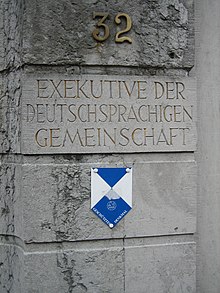
Back Duitse Gemeenskap van België Afrikaans Comunidat Chermanofona de Belchica AN المجتمع البلجيكي الناطق بالألمانية Arabic Нямецкамоўная супольнасць Бельгіі Byelorussian Немскоезична общност в Белгия Bulgarian Kumuniezh alamanek Belgia Breton Comunitat germanòfona de Bèlgica Catalan Německojazyčné společenství Belgie Czech Belgiaid Almaeneg Welsh Deutschsprachige Gemeinschaft German
German-speaking Community
Deutschsprachige Gemeinschaft (German) | |
|---|---|
 | |
 | |
| Coordinates: 50°38′N 06°02′E / 50.633°N 6.033°E | |
| Country | Belgium |
| Region | Wallonia |
| Established | 1984 |
| Capital | Eupen |
| Government | |
| • Executive | Government of the German-speaking Community |
| • Governing parties (2024–2029) | ProDG, CSP, PFF |
| • Minister-President | Oliver Paasch (ProDG) |
| • Legislature | Parliament of the German-speaking Community |
| • Speaker | Patricia Creutz-Vilvoye (CSP) |
| Area | |
• Total | 854 km2 (330 sq mi) |
| Population (1 January 2024)[1] | |
• Total | 79,479 |
| • Density | 93/km2 (240/sq mi) |
| Day of the German-speaking Community | 15 November |
| Language | German (with language facilities for French-speakers) |
| Website | ostbelgienlive |

The German-speaking Community (German: Deutschsprachige Gemeinschaft (Belgiens), pronounced [ˈdɔʏtʃˌʃpʁaːxɪɡə ɡəˈmaɪnʃaft ˈbɛlɡi̯əns], DG),[a] also known as East Belgium (German: Ostbelgien [ˈɔstˌbɛlɡi̯ən] ⓘ),[2][b] is one of the three federal communities of Belgium.[3] The community is composed of nine municipalities in Liège Province, Wallonia, within the Eupen-Malmedy region in Eastern Belgium. The primary language of the community is German, making this one of the three official languages in Belgium. Traditionally the community and the wider area around it forms an intersection of various local languages and/or dialects, namely Limburgish, Ripuarian and Moselle Franconian varieties. The community has an area of 854 km2 (330 sq mi), and has a population of around 79,000 (as of January 2024) – about 7.0% of Liège Province and about 0.7% of the national total.[1]
Bordering the Netherlands, Germany and Luxembourg, the area has its own parliament and government at Eupen. The German-speaking Community of Belgium was annexed in 1920 from Germany. There are also some other areas where German is spoken that belonged to Belgium before 1920, but these are not part of the German-speaking Community. This category includes the Bleiberg-Welkenraedt-Baelen area in the northeastern part of the province of Liège, as well as Arelerland (the city of Arlon and some nearby villages in the southeastern portion of the province of Belgian Luxembourg). However, German is declining in these areas outside of the core German-speaking Community due to the expansion of French.[4]
- ^ a b "België telde 11.763.650 inwoners op 1 januari 2024". Statistics Belgium. 2024-06-04. Retrieved 2024-06-09.
- ^ Rankin, Jennifer (2 May 2017). "Separatism fears grow in Belgium as German speakers assert themselves". The Guardian. Retrieved 21 October 2021.
- ^ "The German-speaking Community". Dglive.be. Archived from the original on 2014-05-04. Retrieved 2014-06-11.
- ^ Society for Threatened Peoples: gfbv.it
Cite error: There are <ref group=lower-alpha> tags or {{efn}} templates on this page, but the references will not show without a {{reflist|group=lower-alpha}} template or {{notelist}} template (see the help page).

